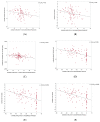Effects of a Low-Fat Vegan Diet on Gut Microbiota in Overweight Individuals and Relationships with Body Weight, Body Composition, and Insulin Sensitivity. A Randomized Clinical Trial
- PMID: 32987642
- PMCID: PMC7598634
- DOI: 10.3390/nu12102917
Effects of a Low-Fat Vegan Diet on Gut Microbiota in Overweight Individuals and Relationships with Body Weight, Body Composition, and Insulin Sensitivity. A Randomized Clinical Trial
Abstract
Diet modulates gut microbiota and plays an important role in human health. The aim of this study was to test the effect of a low-fat vegan diet on gut microbiota and its association with weight, body composition, and insulin resistance in overweight men and women. We enrolled 168 participants and randomly assigned them to a vegan (n = 84) or a control group (n = 84) for 16 weeks. Of these, 115 returned all gut microbiome samples. Gut microbiota composition was assessed using uBiome Explorer™ kits. Body composition was measured using dual energy X-ray absorptiometry. Insulin sensitivity was quantified with the predicted clamp-derived insulin sensitivity index from a standard meal test. Repeated measure ANOVA was used for statistical analysis. Body weight decreased in the vegan group (treatment effect -5.9 kg [95% CI, -7.0 to -4.9 kg]; p < 0.001), mainly due to a reduction in fat mass (-3.9 kg [95% CI, -4.6 to -3.1 kg]; p < 0.001) and in visceral fat (-240 cm3 [95% CI, -345 to -135 kg]; p < 0.001). PREDIcted M, insulin sensitivity index (PREDIM) increased in the vegan group (treatment effect +0.83 [95% CI, +0.48 to +1.2]; p < 0.001). The relative abundance of Faecalibacterium prausnitzii increased in the vegan group (+5.1% [95% CI, +2.4 to +7.9%]; p < 0.001) and correlated negatively with changes in weight (r = -0.24; p = 0.01), fat mass (r = -0.22; p = 0.02), and visceral fat (r = -0.20; p = 0.03). The relative abundance of Bacteroides fragilis decreased in both groups, but less in the vegan group, making the treatment effect positive (+18.9% [95% CI, +14.2 to +23.7%]; p < 0.001), which correlated negatively with changes in weight (r = -0.44; p < 0.001), fat mass (r = -0.43; p < 0.001), and visceral fat (r = -0.28; p = 0.003) and positively with PREDIM (r = 0.36; p < 0.001), so a smaller reduction in Bacteroides fragilis was associated with a greater loss of body weight, fat mass, visceral fat, and a greater increase in insulin sensitivity. A low-fat vegan diet induced significant changes in gut microbiota, which were related to changes in weight, body composition, and insulin sensitivity in overweight adults, suggesting a potential use in clinical practice.
Keywords: diet; gut microbiome; nutrition; obesity; vegan; weight loss.
Conflict of interest statement
The authors declare no conflict of interest.
Figures


References
Publication types
MeSH terms
LinkOut - more resources
Full Text Sources

